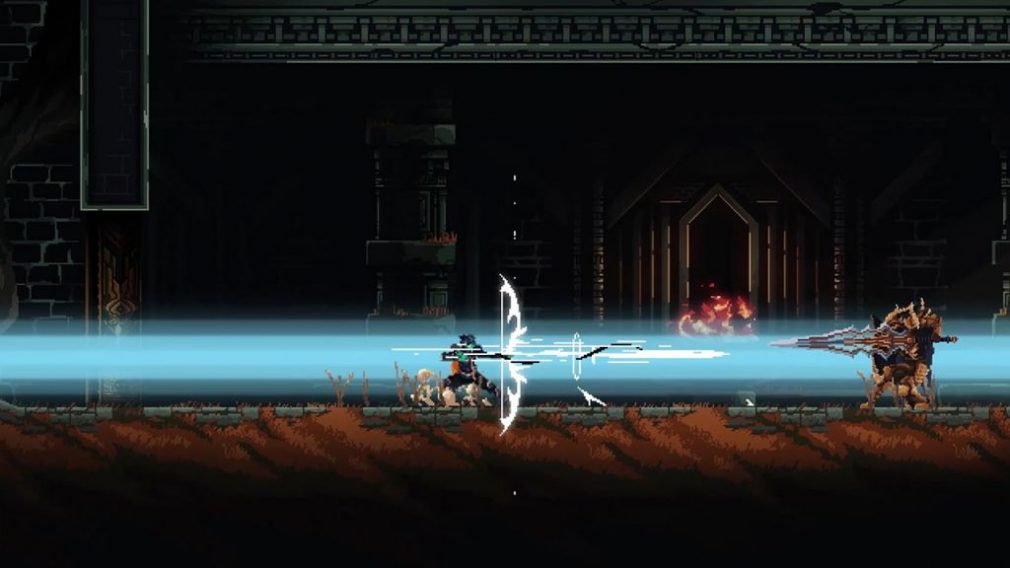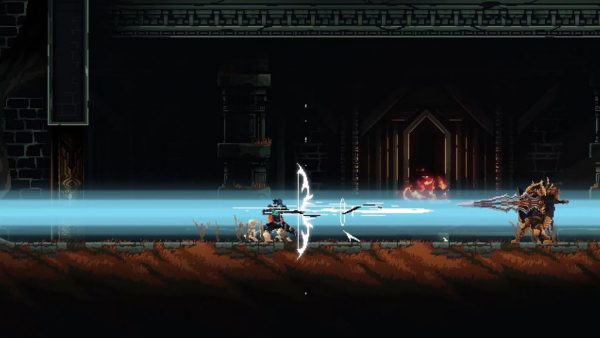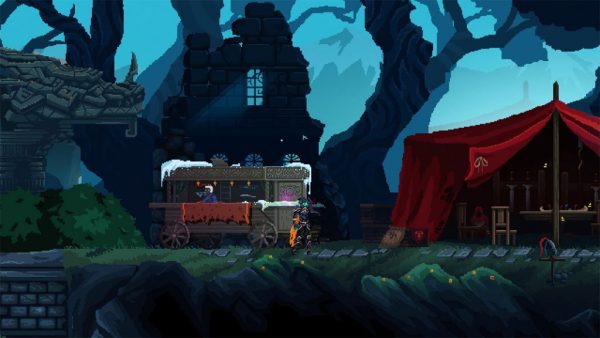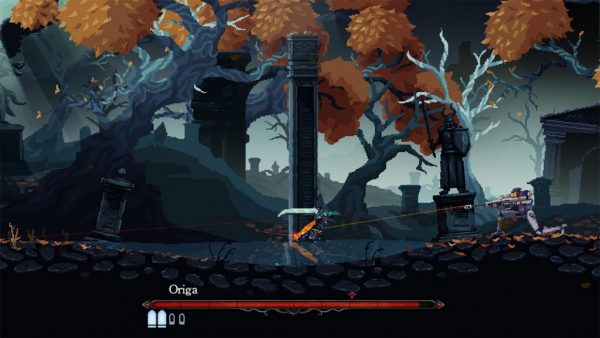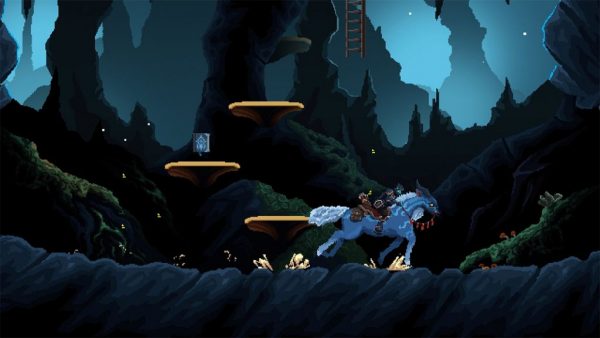Also On: PC
Publisher: Adult Swim
Developer: White Rabbit
Medium: Digital
Players: 1
Online: No
ESRB: T
Death?s Gambit is another in a long line of 2D, side scrolling action platformers that draw heavy inspiration from the From Software developed Souls series. I spend the majority of my time playing, writing about and dreaming about the Souls games so it only stands to reason that I took this game on. One of the things that I love so much about these 2D Souls inspired platformers is the amount of character and uniqueness that the good ones are able to bring. Death?s Gambit certainly manages to draw mechanical inspiration from similar games that came before, but added more than enough of its own flavor and gameplay to make it something special and unique.
Upon first loading in, the similarities to Souls are incredibly apparent, but almost an intentional parody. The character class selection screen is a simplified, shortened character class selection and creation screen we have seen so many times. Each class changes your starting stats, which consist of Vitality (health), Strength, Finesse (dexterity), Endurance (stamina), Intellect (magic) and Haste (bow and cast speed). These again work similar to the Souls games, with each stat being tied to a weapon you use, strength into greatswords, finesse into scythes and so on. Each class also starts with decent gear designed for whatever playstyle your class is designed for. This makes getting started pretty simple, but without a lot of knowledge it is hard to know what build is going to work for you until after you have played a good bit.
In addition to the class selection, you get to choose a starting item, which is just as obscure and difficult as selecting a starting item for the first time in a Souls game. A sentence or two of information under each item description is all you have to go on with the starting item and all of the rest of the items throughout the game. Trial and error is the best bet for finding out what everything does. The tutorial takes the form of tombstones around the first few areas that you read to learn what to do. The game has its own form of bonfires called Death Idols which you rest at to save, level up, and replenish healing items. When you die, you return to the Death Idol you last rested at. Healing is done through the use of healing feathers, which can be collected and upgraded throughout the game. They replenish when you die or rest at a Death Idol. Upgrade materials called shards are collected as you play the game and defeat enemies, and these are NOT lost upon death. Instead, you lose one of your healing feathers every time you die. You can choose to go recover the feather, or you can rest at a Death Idol and pay to recover your lost feathers with shards. This is an interesting and quite frankly enjoyable mechanical change from the Souls games. You can run an area multiple times to farm for upgrade materials and not worry so much about making your way back to a safe area to spend your items. In addition to that, the boss mechanic has also changed up a bit. If you are defeated by a boss, you get upgrade shards based on how much damage you managed to do to that boss. The game also tracks how many times a boss has beaten you, which can be fun and frustrating at the same time.
Movement is precise, with those ledges that are supposed to be just out of your reach staying JUST out of your reach. The ones you need to traverse to are able to be reached with proper timing. Hidden areas are a thrill to find and like any Metroidvania game, are like little puzzles within themselves. Playing with the PS4 controller had a few moments where I felt like the PC would be a better experience but those were very few and far between. All told, traversing the world is something I rarely thought about in between the general exploration and outstanding combat.
And combat is exactly that, outstanding. Timing is everything, from your roll dodges through an enemy to managing your stamina for the right number of hits, blocks and dodges, there is always something to keep you on your toes. Throughout the game you will encounter bosses that will challenge the way you play. From a fast, dagger wielding woman who will dash jump and cut you to ribbons to a massive, armor clad knight summoning lighting from the sky and minions from the ground, no two bosses play exactly the same. The tactics that let you breeze past one boss with barely a hit will leave you broken and frustrated on try number 25 with the next. Death?s Gambit demands that the main character adapts to the changing world around him, and it demands the same of you.
This brings me to my final point, and unfortunately the lowest point of the game, the story. Don?t get me wrong, there is nothing bad here. Several jokes about their Soulsborne origins are thrown around and there is no shortage of interesting characters or jokes here and there, but the story almost honestly feels lost in the gameplay. This game is so mechanically and fundamentally sound, I almost feel like the story is an afterthought at some points. Death?s Gambit tries to again pull a trait of the Souls games and make it work to their advantage with an intentionally obscure story and a lot of information given via the item descriptions, but ultimately it falls a bit flat. Even with flashbacks of your character and their mother I did not feel overly invested in who I was or what my goal was. I simply wanted to get to the next area and find my next boss to tackle. The gameplay loop was satisfying enough to make me want to simply press on and experience more.
At the end of the day, if 2D Souls-inspired action platformers with Metroidvania elements are your thing, you absolutely need to play this game. Story aside, the gameplay is great and the difficulty hits that sweet spot between too hard and too easy. Once you grasp it, it is intuitive and pretty simple but until then you will die, die, die and die some more. With a modest $20 price tag, I recommend it.
Adult Swim provided us with a Death’s Gambit PS4 code for review purposes.

